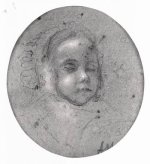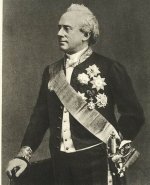NotDavidSoslan
Active member
Early life of Louis Philippe of Belgium (1833–1865)

Louis Philippe as a child
Louis Philippe, the King of Belgium between 1865 and 1904, was born at the Laeken Palace in Brussels on 24 July 1833, and named after the then King of France. The eldest son of King Leopold of Belgium with his wife Louise of Orleans, he had a younger brother, Prince Leopold (1835–1909), who was a strong advocate of colonialism, but was never considered as a successor to the throne.
In 1842, Louis Philippe received the title of Duke of Brabant, and was named a first lieutenant in the army. He served in the army until ascending to the throne in 1865.
Nine years later, Louis Philippe became a member of the Belgian Senate, as the Constitution gave him a seat there upon his majority. He took an active interest in promoting democracy and liberal values, as well as support for the bourgeois, and opposed proposals for a colonial empire. He later became a positivist and humanist, and visited Russia, Hungary, Egypt, Portugal and Spain between 1854 and 1861. Leopold I died on 10 December 1865, and Louis Philippe took an oath of office one week later, at 32.

Louis Philippe as a child
Louis Philippe, the King of Belgium between 1865 and 1904, was born at the Laeken Palace in Brussels on 24 July 1833, and named after the then King of France. The eldest son of King Leopold of Belgium with his wife Louise of Orleans, he had a younger brother, Prince Leopold (1835–1909), who was a strong advocate of colonialism, but was never considered as a successor to the throne.
In 1842, Louis Philippe received the title of Duke of Brabant, and was named a first lieutenant in the army. He served in the army until ascending to the throne in 1865.
Nine years later, Louis Philippe became a member of the Belgian Senate, as the Constitution gave him a seat there upon his majority. He took an active interest in promoting democracy and liberal values, as well as support for the bourgeois, and opposed proposals for a colonial empire. He later became a positivist and humanist, and visited Russia, Hungary, Egypt, Portugal and Spain between 1854 and 1861. Leopold I died on 10 December 1865, and Louis Philippe took an oath of office one week later, at 32.


